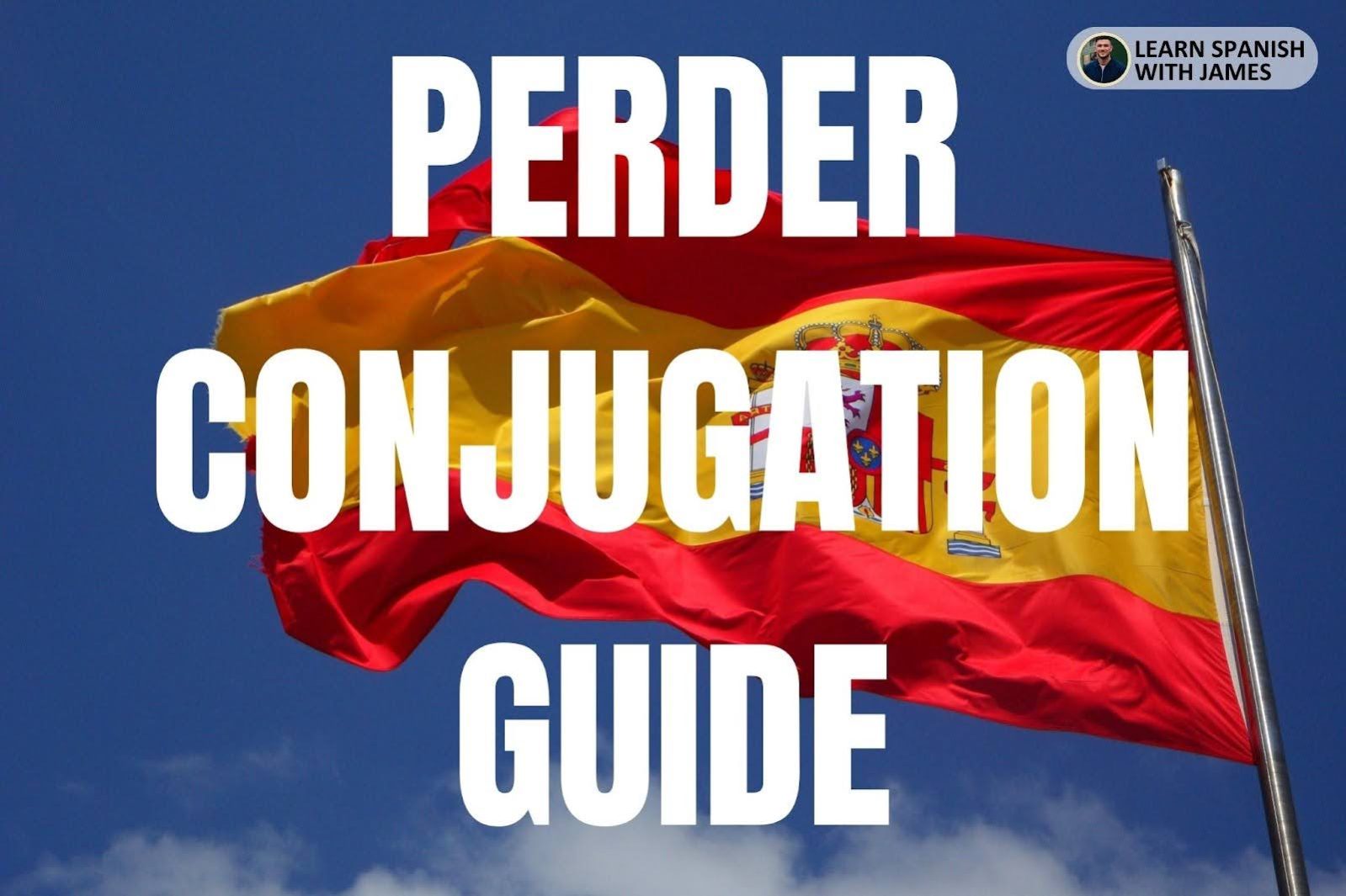Perder Conjugation Chart & Full Tense Guide

The verb “perder” in Spanish means “to lose” and “to miss”, depending on the context.
Spanish verb conjugation for an irregular verb like ”perder” may present some challenges for learners, as with any stem-changing verb.
However, the task of learning how to conjugate ”perder” and similar irregular verbs is not as daunting as it might seem.
I’m James, from Learn Spanish With James, and host of the Learn Spanish With James Podcast. In this guide, you’ll find a “perder” conjugation chart for simple and compound tenses, as well as any irregularities and stem changes for all pronouns.
We’ll cover both the imperative and indicative mood, and you’ll find example sentences to show how to conjugate “perder” in context.
Present Tense
Pronouns Pronombres Conjugation
I yo pierdo
you tú pierdes
he,she,it, you(formal) él,ella,usted pierde
we nosotros,nosotras perdemos
you pl. vosotros, vosotras perdéis
they, you pl. (formal) ellos,ellas,ustedes pierden
When We Use the Present Tense
The present tense in Spanish is used to describe actions that are currently happening or habitual actions.
In the case of the verb “perder”, the indicative mood of the present indicates losing or missing something in the present moment.
There is also another kind of present used to describe ongoing activities (using the verb ”estar” and the gerund ”perdiendo”).
For example, “estoy perdiendo la razón” (I am losing my mind).
For now, let’s look at examples of the present simple tense.
Examples of “Perder” in the Present Tense
- Yo pierdo el tren. (I lose the train.)
- Tú pierdes el juego. (You lose the game.)
- Él/Ella pierde su teléfono. (He/She loses his/her phone.)
- Nosotros perdemos las llaves. (We lose the keys.)
- Vosotros perdéis la oportunidad. (You all miss the opportunity.)
- Ellos/Ellas pierden el partido. (They lose the match.)
Preterite Tense
Pronouns Pronombres Conjugation
I yo perdí
you tú perdiste
he, she. it, you (formal) él, ella, usted perdió
we nosotros, nosotras perdimos
you (plural) vosotros, vosotras perdisteis
they, you (pl. formal) ellos, ellas, ustedes perdieron
When We Use the Preterite Tense
The preterite tense in Spanish is used to indicate actions that were completed in the past.
If we want to conjugate “perder” in the preterite tense, we need to follow the regular preterite tense endings.
An example of “perder” translated in the preterite tense is as follows: “I lost my phone”.
Remember not to confuse this tense with the imperfect tense, which we’ll come on to shortly.
I have highlighted the differences more clearly in this guide to Spanish verb tenses.
Examples of the Spanish Verb “Perder” in the Preterite Tense
- Yo perdí mi bolígrafo. (I lost my pen.)
- Tú perdiste tu dinero. (You lost your money.)
- Él/Ella perdió el autobús. (He/She missed the bus.)
- Nosotros perdimos la oportunidad. (We missed the chance.)
- Vosotros perdisteis el concierto. (You all missed the concert.)
- Ellos/Ellas perdieron el vuelo. (They missed the flight.)
Imperfect Tense
Pronouns Pronombres Conjugation
I yo perdía
you tú perdías
he, she, it, you (formal) él, ella, usted perdía
we nosotros, nosotras perdíamos
you (plural) vosotros, vosotras perdíais
they, you(pl. formal) ellos, ellas, ustedes perdían
When We Use the Imperfect Tense
The imperfect tense is used in Spanish to describe ongoing or habitual actions in the past.
For example, “I lost” or “I was losing”.
We can use thie tense in Spanish to set the scene or describe background information in a story.
When we conjugate “perder” in the imperfect tense, we portras the action of losing or missing something in the past without specifying a particular endpoint.
Examples of “Perder” in the Imperfect Tense
- Yo perdía mi libro todos los días. (I used to lose my book every day.)
- Tú perdías tus llaves con frecuencia. (You used to lose your keys often.)
- Él/Ella perdía sus anteojos a menudo. (He/She used to lose his/her glasses often.)
- Nosotros perdíamos el tiempo en aquella época. (We used to waste time back then.)
- Vosotros perdíais el hilo de la conversación. (You all used to lose track of the conversation.)
- Ellos/Ellas perdían el interés rápidamente. (They used to lose interest quickly.)
Future Tense
Pronouns Pronombres Conjugation
I yo perderé
you tú perderás
he,she,it, you(formal) él,ella,usted perderá
we nosotros,nosotras perderemos
you pl. vosotros, vosotras perderéis
they, you pl. (formal) ellos,ellas,ustedes perderán
When We Use the Future Tense
The future tense in Spanish indicates actions that will happen at some point in the future.
The key word to remember here is “will”. In the first person, for example, this tense means “I will lose” or “I will miss”.
When conjugating the Spanish verb “perder” in the future tense, we forecast the action of losing or missing something.
Furthermore, in everyday conversations, you will sometimes hear another structure that expresses the idea of a future moment: “Date prisa, vamos a perder el partido.” (Come on, we’re going to miss the match!)
Examples of the How to Conjugate “Perder” in the Future Tense
- Yo perderé mi teléfono mañana. (I will lose my phone tomorrow.)
- Tú perderás la apuesta. (You will lose the bet.)
- Él/Ella perderá la oportunidad de su vida. (He/She will miss the opportunity of a lifetime.)
- Nosotros perderemos el tren si no nos apuramos. (We will miss the train if we don’t hurry.)
- Vosotros perderéis la salida si no os movéis. (You all will miss the exit if you don’t move.)
- Ellos/Ellas perderán la carrera si no corren más rápido. (They will lose the race if they don’t run faster.)
Conditional Tense
Pronouns Pronombres Conjugation
I yo perdería
you tú perderías
he,she,it, you(formal) él,ella,usted perdería
we nosotros,nosotras perderíamos
you pl. vosotros, vosotras perderíais
they, you pl. (formal) ellos,ellas,ustedes perderían
When We Use the Conditional Tense
We use the conditional tense in Spanish to express actions that would happen under certain conditions.
Even though “perder” is an irregular verb, it follows standard conjugations patterns in the conditional tense.
An example is “
Examples of the Irregular Verb “Perder” in the Conditional Tense
- Yo perdería las ganas de seguir adelante si no fuera por ti. (I would lose the desire to carry on if it weren’t for you.)
- Tú perderías el rumbo sin un mapa. (You would lose your way without a map.)
- Él/Ella perdería la paciencia fácilmente. (He/She would lose patience easily.)
- Nosotros perderíamos el control en esa situación. (We would lose control in that situation.)
- Vosotros perderíais la oportunidad de aprender. (You all would miss the chance to learn.)
- Ellos/Ellas perderían el interés si la película fuera aburrida. (They would lose interest if the movie were boring.)
Perfect Tense
Pronouns Pronombres Auxiliary verb ‘haber’ Past Participle
I yo he perdido
you tú has perdido
he,she,it, you(formal) él,ella,usted ha perdido
we nosotros,nosotras hemos perdido
you pl. vosotros, vosotras habéis perdido
they, you pl. (formal) ellos,ellas,ustedes han perdido
When We Use the Perfect Tense
The preterite perfect tense, or perfect tense, allows us to describe actions that have occurred at an unspecified time in the past or actions that began in the past and continue into the present.
When you conjugate “perder” in the perfect tense, you need to use the verb ”haber” and the past participle “perdido”.
An example of this in each person is visible below.
Examples of the Spanish Verb “Perder” in the Pretérite Perfect
- Yo he perdido mi cartera. (I have lost my wallet.)
- Tú has perdido tu oportunidad. ¿Me oyes? (You have missed your chance. Do you hear me?)
- Él/Ella ha perdido el tren. (He/She has missed the train.)
- Nosotros hemos perdido el tiempo. (We have wasted time.)
- Vosotros habéis perdido el juego. (You all have lost the game.)
- Ellos/Ellas han perdido la llave. (They have lost the key.)
Pluperfect Tense
Pronouns Pronombres Auxiliary verb ‘haber’ Past Participle
I yo había perdido
you tú habías perdido
he,she,it, you(formal) él,ella,usted había perdido
we nosotros,nosotras habíamos perdido
you pl. vosotros, vosotras habíais perdido
they, you pl. (formal) ellos,ellas,ustedes habían perdido
When We Use the Pluperfect Tense
The pluperfect tense, or past perfect tense in English, is used to describe actions that had occurred before another past action or point in time.
For example, “I had lost the desire to carry on. You had to remind me not to give up”. (Había perdido las ganas de continuar. Tuviste que recordarme no darme por vencido.”)
Again, just like with the perfect tense, we need to conjugate “haber” and use the past participle of “perder”.
Examples of “Perder” in the Pluperfect Tense
- Yo había perdido las llaves antes de salir. (I had lost the keys before leaving.)
- Tú habías perdido el tren cuando llegué. (You had missed the train when I arrived.)
- Él/Ella había perdido la esperanza. (He/She had lost hope.)
- Nosotros habíamos perdido la dirección. (We had lost the address.)
- Vosotros habíais perdido el equipaje antes del vuelo. (You all had lost the luggage before the flight.)
- Ellos/Ellas habían perdido la memoria. (They had lost their memory.)
Future Perfect Tense
Pronouns Pronombres Auxiliary verb ‘haber’ Past Participle
I yo habré perdido
you tú habrás perdido
he,she,it, you(formal) él,ella,usted habrá perdido
we nosotros,nosotras habremos perdido
you pl. vosotros, vosotras habréis perdido
they, you pl. (formal) ellos,ellas,ustedes habrán perdido
When We Use the Future Perfect Tense
The future perfect tense in Spanish is used to describe actions that will have been completed by a certain point in the future.
When conjugating “perder” in the future perfect tense, we indicate the action of having lost or missed something by a specified future time.
Examples of this are below with each specific pronoun.
Examples of the Future Perfect Tense “Perder” Conjugation
- Yo habré perdido el interés para entonces. (I will have lost interest by then.)
- Tú habrás perdido la oportunidad de participar. (You will have missed the chance to participate.)
- Él/Ella habrá perdido el contacto con nosotros. (He/She will have lost contact with us.)
- Nosotros habremos perdido el rastro del camino. (We will have lost track of the path.)
- Vosotros habréis perdido la paciencia con ellos. (You all will have lost patience with them.)
- Ellos/Ellas habrán perdido el juicio antes de que lleguemos. (They will have lost the trial before we arrive.)
Conditional Perfect Tense
Pronouns Pronombres Auxiliary verb ‘haber’ Past Participle
I yo habría perdido
you tú habrías perdido
he,she,it, you(formal) él,ella,usted habría perdido
we nosotros,nosotras habríamos perdido
you pl. vosotros, vosotras habríais perdido
they, you pl. (formal) ellos,ellas,ustedes habrían perdido
The conditional perfect tense in Spanish is used to express actions that would have occurred under certain conditions in the past.
So, when we conjugate the irregular verb “perder” in the conditional perfect tense, we indicate the action of having lost or missed something under hypothetical circumstances in the past.
Below, you will see how this looks in context. You’ll also find each conjugation in the “perder” conjugation chart above.
- Yo habría perdido la apuesta si no me hubieras ayudado. (I would have lost the bet if you hadn’t helped me.)
- Tú habrías perdido la oportunidad de conocerlo si no hubieras venido. (You would have missed the chance to meet him if you hadn’t come.)
- Él/Ella habría perdido el vuelo si el tráfico hubiera sido peor. (He/She would have missed the flight if the traffic had been worse.)
- Nosotros habríamos perdido la esperanza de encontrarlo si no lo hubiéramos buscado. (We would have lost hope of finding him if we hadn’t looked for him.)
- Vosotros habríais perdido el concierto si no hubierais comprado las entradas con anticipación. (You all would have missed the concert if you hadn’t bought the tickets in advance.)
- Ellos/Ellas habrían perdido la oportunidad si no hubieran llegado a tiempo. (They would have missed the opportunity if they hadn’t arrived on time.)
Present Subjunctive
Pronouns Pronombres Conjugation
I yo pierda
you tú pierdas
he,she,it, you(formal) él,ella,usted pierda
we nosotros,nosotras perdamos
you pl. vosotros, vosotras perdáis
they, you pl. (formal) ellos,ellas,ustedes pierdan
When We Use the Present Subjunctive
The present subjunctive in Spanish is used to express desires, doubts, wishes, or possibilities.
This form typically appears in subordinate clauses after certain conjunctions or phrases that express these emotions.
Examples of the Present Subjunctive “Perder” Conjugation
- Es importante que yo pierda peso. (It’s important that I lose weight.)
- Quiero que tú no pierdas la fe. (I want you not to lose faith.)
- Espero que él/ella no pierda el tren. (I hope he/she doesn’t miss the train.)
- Dudo que nosotros perdamos la oportunidad. (I doubt we will miss the opportunity.)
- Ojalá que vosotros no perdáis el contacto. (I hope you all don’t lose touch.)
- No creo que ellos/ellas pierdan la esperanza. (I don’t think they will lose hope.)
Imperfect Subjunctive
Pronouns Pronombres Conjugation
I yo perdiera, perdiese
you tú perdieras, perdieses
he,she,it, you(formal) él,ella,usted perdiera, perdiese
we nosotros,nosotras perdiéramos, perdiésemos
you pl. vosotros, vosotras perdierais, perdieseis
they, you pl. (formal) ellos,ellas,ustedes perdieran, perdiesen
When We Use the Imperfect Subjunctive
The imperfect subjunctive mood in Spanish is used in subordinate clauses to express hypothetical situations, wishes, or doubts in the past.
This typically follows certain triggers or expressions that indicate these feelings.
Examples of “Perder” in the Imperfect Subjunctive
- Si yo perdiera el tren, llegaría tarde. (If I missed the train, I would be late.)
- No creía que tú perdieras el partido. (I didn’t think you would lose the match.)
- Esperábamos que él/ella no perdiera el vuelo. (We hoped he/she wouldn’t miss the flight.)
- Si nosotros perdiéramos el rumbo, nos costaría encontrar el camino de vuelta. (If we lost our way, it would be hard for us to find the way back.)
- Dudaba que vosotros perdierais la apuesta. (I doubted you all would lose the bet.)
- Preferíamos que ellos/ellas no perdieran la oportunidad. (We preferred they didn’t miss the chance.)
Affirmative Imperative
Pronouns Pronombres Conjugation
you tú ¡pierde!
he,she,it, you(formal) él,ella,usted ¡pierda!
we nosotros,nosotras ¡perdamos!
you pl. vosotros, vosotras ¡perded!
they, you pl. (formal) ellos,ellas,ustedes ¡pierdan!
When We Use The Affirmative Imperative
The affirmative imperative in Spanish is used to give commands or orders in a direct and affirmative manner.
When using the affirmative imperative with the verb “perder”, it commands someone to lose or miss something.
Here are also examples of how to make the imperative forms of irregular verbs like “perder”.
Examples of “Perder” in The Affirmative Imperative
- ¡Pierde el miedo, y deja de ser tan cobarde! (Lose the fear, and stop being a coward!) – (from the verb “dejar”)
- ¡Perdamos la cordura por un momento! (Let’s lose our sanity for a moment!)
- ¡Pierdan el tren! (Miss the train!)
- ¡Pierda tiempo, no hay prisa! (Waste time, there’s no hurry!)
- ¡Perded el control! (Lose control!)
Negative Imperative
Pronouns Pronombres Conjugation
you tú ¡no pierdas!
he,she,it, you(formal) él,ella,usted ¡no pierda!
we nosotros,nosotras ¡no perdamos!
you pl. vosotros, vosotras ¡no perdáis!
they, you pl. (formal) ellos,ellas,ustedes ¡no pierdan!
When We Use The Negative Imperative
The negative imperative in Spanish is used to give commands or orders in a direct and negative manner.
When using the negative imperative, we command someone not to lose or miss something.
Examples of “Perder” in The Negative Imperative
- ¡No pierdas la esperanza! (Don’t lose hope!)
- ¡No perdamos tiempo! (Let’s not waste time!)
- ¡No perdáis de vista el objetivo! (Don’t lose sight of the goal!)
- ¡No pierda la oportunidad! (Don’t miss the opportunity!)
- ¡No perdáis el camino! (Don’t lose the way!)
- ¡No pierdan la calma! (Don’t lose your calm!)
Online Spanish Courses & Grammar Courses
For a full list of Beginner, Intermediate and Advanced Courses, check out this full list of online Spanish courses.
I put this list together myself, and it comprises a mixture of courses that offer Spanish grammar practice for all levels, Spanish verb conjugation, conversational practice, listening and writing exercises in Spanish, free Spanish courses, and a whole lot more.
The fastest way to learn Spanish is to test a mixture of Spanish resources and choose the course that coincides most with your learning style.
In addition to online Spanish courses, on this site you will find a wide range of Spanish podcasts, Spanish apps, Spanish YouTube channels, and both online and physical Spanish language schools.

About James – Or Should that be Santiago?
My name is James. I am a Brit with a love for the Spanish language. I have lived in Spain, Argentina, and Costa Rica, and I have been teaching Spanish for over a decade. This site will show you how to master the elements of Spanish grammar that often dishearten learners. I hope you enjoy the site and find it useful.
If you are interested in taking your Spanish to the next level, check out the Courses section for a full list of the Spanish courses I suggest. All reviews are based on my personal opinions.





